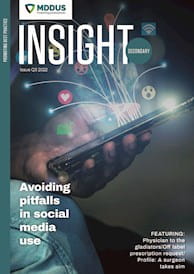BACKGROUND
Dr P, a specialty trainee, is called to review a severely unwell patient, Mr L, who has been receiving care on a medical ward. The patient had been admitted the previous afternoon after collapsing in his home, and has a history of alcoholic liver disease.
Dr P assesses the patient and orders immediate IV fluids. Contact is made with the consultant with a view to referring Mr L to the high-dependency unit. Dr P hands over care of the patient and continues her normal duties.
Three months later Dr P is contacted by the hospital clinical service manager who is carrying out a serious clinical incident investigation (SCI). It transpires that Mr L died the day after Dr P treated him, and patient records appear to show a lack of adequate observations undertaken during the night, including blood pressure or other essential checks.
The manager would like Dr P to write an account for the SCI, detailing her involvement in the care of the patient. Dr P is unsure of what to write and is worried about being criticised for her actions in caring for Mr L. She contacts MDDUS for advice.
ANALYSIS/OUTCOME
An MDDUS medico-legal adviser (MLA) speaks to Dr P and reassures her that the purpose of an SCI is not to apportion blame. Rather, it is similar to a significant event analysis in that it seeks to review what, if any, lessons can be learned and what can be done differently to prevent a similar situation occurring in future.
Dr P is advised to be mindful of the guidance in Good medical practice at paragraph 71 when writing her statement. She should review the contemporaneous medical records and ensure that the facts in her account accord with those records, including specific dates and times where appropriate.
She should avoid any speculation about the events leading up to the patient’s death and avoid stating any personal opinions relating to other colleagues’ behaviour.
Generally, such statements would begin by stating the reason for writing it as well as any sources that have been consulted, for example, whether the patient’s notes were reviewed or events were recalled from memory.
It should then go on to include a brief overview of Dr P’s professional background, including qualifications, previous experience and length of time in current post, before detailing the events of the period of time in question, up until her contact with the patient ended. It would be helpful to avoid jargon where possible and to explain any clinical terms or abbreviations.
It may be relevant to also detail any history or examination findings that Dr P noted in the patient’s record, giving a full account of the review that was undertaken, including her working diagnosis. If it is the case that no overnight observations were available when she attended the patient, then Dr P should note this in the statement.
The MLA suggests Dr P may wish to conclude the statement by expressing her condolences for the patient’s death and confirming that this is “a true and accurate account” of her involvement in the care of the patient.
Once Dr P has drafted her statement, the MLA offers to review it and provide further suggestions.
KEY POINTS
- Ensure that you review the relevant medical records in preparation for drafting a statement.
- Stick to the facts and avoid any speculation or personal comment.
- Be reassured that the purpose of serious clinical incident investigations is to prevent future harm rather than apportion blame.
- Contact MDDUS for assistance in reviewing draft statements or responses.
This page was correct at the time of publication. Any guidance is intended as general guidance for members only. If you are a member and need specific advice relating to your own circumstances, please contact one of our advisers.
Read more from this issue of Insight Secondary

Save this article
Save this article to a list of favourite articles which members can access in their account.
Save to library

